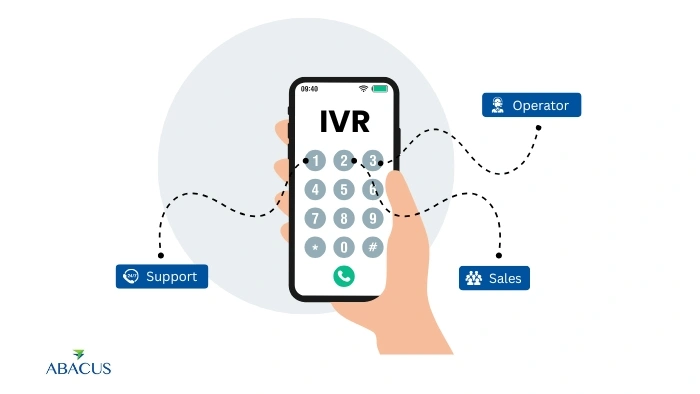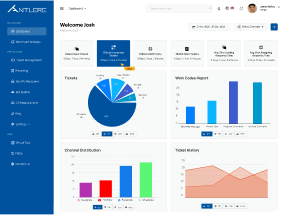IVR vs Live Agents – When to Use What?
In today’s fast-paced business environment, delivering seamless customer support is a top priority. If you are having a startup or an enterprise-level operation, you might have given a thought to the question- IVR system Or Human Agents? However, when is it the right time to use an IVR agent, and when do you hand over the call to a human?
Want the balance of automated IVR and human support explained, including what works best for different business scenarios? This blog has it all! And we will see how IVR technology, call center IVR systems and IVR software have evolved with modern customer demands.
What is IVR?
IVR Interactive Voice Response (IVR) is a technology that enables callers to interact with a business’s phone system by voice or touch-tone. It is an economical and highly scalable solution for high-volume customer support as it allows avoiding an agent answering every call.
What does IVR stand for? Simply put, IVR stands for Interactive Voice Response. ; It is the foundation for many IVR contact centers and also a prominent component of an IVR phone system.
In the last few years IVR or Interactive voice response technology has evolved in no time. Gone are the days of simple voice menus now, top-notch IVR systems are performing natural speech recognition, secure user authentication, and context-aware conversations driven by AI. This has ensured that IVR Solutions are no longer simply automated assistants, but instead a key component of an enterprise customer experience strategy.

IVR vs Human Agent: The Key Differences
Feature | IVR Agent | Human Agent |
Availability | 24/7 support | Limited to working hours |
Cost | Low operational cost | Higher due to salaries/benefits |
Emotional Intelligence | None | High |
Scalability | Instantly scalable | Requires hiring & training |
Complexity Handling | Best for simple tasks | Best for complex interactions |
Response Consistency | Always consistent | May vary based on mood/expertise |
An efficient IVR cuts down the wait time, routes your calls in a smart manner and ensures you get a quick resolution. But a human agent can feel emotion adjust to unpredictability and use the rapport factor which is so important in a sensitive or a valuable customer handling situation.
When to Use IVR Solutions
Smart modern IVR or Interactive Voice response solution is way beyond a robotic menu tree. AI and natural language processing – IVR systems have grown smarter and more intuitive. Here are ideal use cases:
High Call Volume with Simple Queries
For example, if your business has a high call volume with thousands of incoming calls every day that are mainly used to find routine information such as account balance, order status, or business hours, then IVR call center will take care of these calls in automation mode.
24/7 Customer Support
Having an IVR service will ensure that your customers are never out of reach when it comes to basic support, even on holidays or after-hours due to its 24/7 availability.
Initial Call Routing
IVR systems can gather customer ID, intent and issue type before connecting customers to a live agent. This allows the IVR contact center to route the call to the most appropriate IVR agent.
Self-Service Options
From bill payments, appointment confirmations to shipment tracking, most of the customers want the self-service option. These can be resolved by an IVR phone system without needing an agent to intervene.

Security and Authentication
An advanced interactive voice response system can authenticate callers using their voice, or a combination of voice biometrics and keypads input, creating a barrier that makes it a secure entrance to transactions that include sensitive data.
Data Collection and Surveys
Post-call feedback, automated surveys, and customer satisfaction metric can be collected without human intervention via IVR services.
When to Use Human Agents
IVR software is pretty efficient on its own, but it lacks the emotional intelligence and critical-thinking abilities of a human. When you should request a human agent:
Complex or Sensitive Issues
Empathy-driving scenarios such as complaints, billing disputes, or technical issues require a human touch.
High-Value Customers
With VIP clients, it may be better to skip the IVR solution and go right to white-glove service with a live agent.
Upselling & Cross-Selling
A voice response system would overlook that, but human agents do a better job of identifying potential sales opportunities in conversations.
Escalation Handling
Only a live agent can de-escalate a frustrated customer, if that is required to fix their experience.
Problem Solving and Negotiation
While IVR systems do all they can, live agents take the helm to assess the customer demands on the fly, extend customized offers, and, if not against corporate policy, even bargain for refunds or upgrades.
Combining IVR and Live Agents: The Hybrid Model
This is why most businesses are opting for a hybrid model mixing IVR with human agents. Here’s how this works:
- IVR handles first-level inquiries (e.g., press 1 for account balance, press 2 for technical support)
- Transfers to live agent only when necessary
- Call center IVR logs caller data, reducing handling time for agents
This maintains the human element where it matters while minimizing costs overall.
This experience can be improved even more by integrating IVR with CRM platforms; when a call is transferred, agents will be able to view customer history instantly and create a seamless, personalized experience.

IVR Software and Pricing Considerations
For comparing providers, look beyond the features and compare other factors such as the integration, scalability, cost etc. If you are assessing vendors (like Dialpad), please note that the Dialpad pricing comes with voice and contact center solutions that seamlessly integrate with modern IVR services.
Typical IVR pricing models:
- Per-minute usage
- Per-user seat license
- Flat-rate monthly plans
There is a wide range of IVR service providers that offer AI-enhanced IVR capabilities, advance analytics dashboards, and integration with tools such as Salesforce or Zendesk—all the features that will appeal to anywhere between scaling business to enterprises. Though, do not invest on IVR phone when it does not align with your business goals.
Industry Trends and Stats
- Over 60% of businesses use some form of IVR system to automate front-line customer service.
- Properly implemented IVR solutions can reduce customer wait times by up to 40%.
- 75% of customers say they prefer companies that offer a mix of self-service and live agent options.
- The global IVR services market is projected to reach $6.7 billion by 2027.
These figures demonstrate that IVR systems aren’t going anywhere—they’re becoming smarter, more integrated, and essential for modern support.
Conclusion: Choosing the Right Tool for the Right Task
The argument of IVR or human agent is not to replace a person by a machine. It’s using the best of both worlds to make the most efficient support strategy.
Automate, scale, and streamline things by using these IVR systems. Use live-speaking specialists to resolve concerns needing compassion, reasoning, complex decision-making, etc.
All in all, smart businesses are not choosing IVR over humans or vice versa; rather, they are determining how to make optimal use of both.
Whether you are considering IVR software, an IVR phone system, full IVR solutions, or hybrid IVR software, look for the solutions that will fit client demands. So, that’s the future of customer experience too: intelligent, scalable and more human where it matters.
Contact Abacus Outsourcing and make the perfect choice between IVR vs Human Agent.










